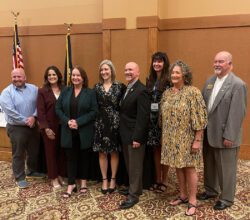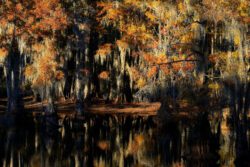by Robert "Bob" Bussey
Music in poetry? Poetry in music? A novel idea? Not really. What makes a poem sound pleasing to the ear? A solid rhythm for one thing — something we know a good song also has. The blues stanzas of Harlem Renaissance poet Langston Hughes. The intention of Blues lyrics is to express an emotion. The blues rhythm originated in African American field hollers and work songs, and some trace it to centuries-old songs by griots of West Africa.
In the region of West Africa known as the western Sahel, legendary tales are shared and passed down in various ways. Spoken words are the most well-known way to tell these kinds of stories. They are told by people known as griots (pronounced gree-oh). Griots are poets, historians, genealogists, and musicians. Griots accompany their poems, stories, and songs with music from instruments like the kora (a stringed instrument similar to a harp) or balafon (a kind of xylophone). For centuries, griots have passed down the epics of the Sahel through songs, poems, and stories, with each person adding details that related to their lives and the lives of their audiences. This is how the stories remained relevant across generations. Glen Norman brings that tradition to his poetry by infusing it with his own history. But he also mixes it with the Blues as his poems talk about lost love, suffering, despair, and sexual encounters. Blues poetry is often wrapped into Blues songs that also speak of love, suffering, despair, and sex, all with rhythm.
Here is an example:
Lead Belly’s, “Good Morning Blues”:
Good morning blues. How do you do?
Good morning blues. How do you do?
I’m doing all right. Good morning. How are you?
Note the rhythm of the lines, the repetition, and the rhyme of the last line to the previous two. But blues poems do not always have to take that exact pattern. As with most other forms of poetry, breaking new ground is something poets yearn to do. An example is Langston Hughes, probably the most famous Blues Poets to come out of America. He was born in 1902 in Joplin, Missouri and later went on to become one of America’s most famous Black Blues poets. Here is one of his first poems: (Note the rhythm):
The Negro Speaks of Rivers
I’ve known rivers:
I’ve known rivers ancient as the world and older than the flow of human blood in human veins.
My soul has grown deep like the rivers.
I bathed in the Euphrates when dawns were young.
I built my hut near the Congo and it lulled me to sleep.
I looked upon the Nile and raised the pyramids above it.
I heard the singing of the Mississippi when Abe Lincoln went down to New Orleans, and I’ve seen
its muddy bosom turn all golden in the sunset.
I’ve known rivers:
Ancient, dusky rivers.
My soul has grown deep like the rivers.
Blues poetry comes from the African American oral tradition and the musical tradition of the blues. A Blues poem normally takes on themes such as struggle, despair, and sex. You can see that in the poem by Langston Hughes that is set out above, especially the themes of struggle and despair. Glen Norman is a blues poet. An “Oral Tradition” Blues poet who lives in Central Louisiana.
Although the blues are often about struggle and depression, they are also full of determination to overcome difficulty “through toughness of spirit.” This resilience in the face of hardship is one of the hallmarks of the Blues poem.
Glen has lived the blues and writes about the blues. His early childhood was full of sorrow. He lived his early formative years with his mom in Louisiana. His dad, mainly unknown since he lived in California, did not come into the picture until Glen’s mom passed away from cancer. Glen was 10. His dad popped up at that time and took Glen to California. On top of the shock of losing his mom, his bedrock, he was thrown into a dysfunctional situation. His dad was no prince. In fact, he was far less than a prince, and moved Glen all around California as he went from one failed job to another. Down on his luck his dad traveled back to Louisiana with Glen, and some of Glen’s relatives took Glen in and told his dad to simply leave.
But that was not the end of problems for Glen, and he wound up, during the later part of his high school career, bouncing from one house to another. He did play on his high school football team, and the head coach would pick him up for school and take him to wherever he was living after football practice was over. That coach helped him stay in school and eventually graduate. Glen then started getting his life together by attending college and joining the National Guard. His childhood problems were now behind him. However, he draws from those early problems for his style of poetry.
According to Glen, his poems “stem from an emotional connection to his past.” Many of his poems, if not all of them, are partly autobiographical. Some of his work talks about his past emotional issues, but then go on to talk about what he would like to see happen. He wants to “be able to change what he has experienced.” His book S.W.A.G. (Stay With A Goal) is composed of 5 chapters that painstakingly lead the reader through his early years. From those you learn about his close relationship to his mom, about his drug addict dad, and even about his close relatives who ended up not being so close after all.
You really need to read his life story to then understand where he is coming from in his “Rhythm and Blues poetry.” Those poems are about pain, about grief, about betrayal, but then also about recovery, moving on, creating a better life. The very first poem he wrote was about the loss of his mom that happened when he was 12 years old. He wrote that poem while in college. Its title, “The Unseen Enemy,” leads the reader into the poem:
“As I sit here in deep thought
Wondering how this pain is meant to be fought”
With these opening lines you can sense the rhythm, the beat, that is classic to Blues poetry. You can also immediately sense the personal pain that the writer has experienced … another classic part of Blues poetry and even blues music. That poem and others can be found in his book: S.W.A.G. The book was published in 2015. Glen has continued to set down his words in blues poetic form, although he does not always follow the classic Blues poetry pattern. More important is the setting down the emotions, the feelings, that are the hallmark of Blues poetry. One he just penned in 2023 is set out below.
LIFE IN THE WRONG FOCUS
Take a look; through the glare of my lens
After a mere blink, quick second
The only place where clear sight
Isn’t going to tell you how the story ends.
See … Just past the optical nerve
You take a few quick curves
Capture some moments that were deserved
But the rest … Well … All a blur.
Hmm
How did you undergo
Life in slo mo, moving so slow
Keeping track of everything like a mofo
But still miss things that were meant for upload
Idk
Is it because life is meant to be missed
That text not meant to be sent
What I’m really SEEing is a gust of wind?
Hang on … hang on … hang on …
Let me close my eyes and shake my head
I think I’m losing it again
Ok … reopen. Still here
Same thing happening.
Clock ticking faster
My mind is all a disaster, trying to capture
All of the rapture
I’m staring through the glare of my lens but the blur strength is too strong in
my aperture.
So I adjust because it’s a must
Background clears up
Everything shifted uh
I guess I missed it bruh
Next time I’ll invite my boy Nick
To bring the Canon
Because before my lens expire
I want to enjoy everything around my standing
See … a wise dead man once told me
I’ll rest when I die
I really didn’t understand why
A dead carcass don’t need rest
I never closed my eyes
My lens stayed wide open
Eyes bloodshot red trying to stay focused
The another person … alive this time
Told me I was looking the right way but still didn’t notice. I’m not joking.
Like … I’m furious at this point
I haven’t had any sleep in a month
Trying to see everything in this joint
Very close to giving up
More time flies by … still no luck, no sleep
I waited one more week … I’m 93
My lens still didn’t get to see everything I thought it was meant to see
The world passed me by and I didn’t even get a chance to blink.
You can sense despair throughout this poem to the bitter end, and also a rhythm between the lines. But you can also sense the spirit of not giving up, even in the face of hardship. (So I adjust because it is a must.) All of these are classic to Blues poetry and Blues music.
Glen is a blues spoken word poet. He doesn’t read his poems from an iPhone, from flash cards, or any other aide. He has the poems in his head and speaks them directly to the listener. In that fashion, he is able to infuse his poetry with his inner emotions and inner knowledge of where the poems came from. He bucks the trend of poets reading from manuscripts or from iPhones. This is in the grand tradition of the griots from Africa. Their poems and songs have been passed down from generation to generation via the spoken word … All from memory. He might have to read his poem a hundred times before he gets in front of an audience, but his poems are all directly from his memory and heart.
You can find Glen delivering his poetry in coffee house settings with audiences of 15 to 20 people which gives him the ability to be closer to his audience. He wants his audience to “feel, hear, and touch his poetry. “
You can find Glen’s book, S.W.A.G., at the following internet locations:
https://www.barnesandnoble.com/w/swag-glen-paul-norman-jr/1121071238
https://www.authorhouse.com/en-gb/bookstore/bookdetails/698447-s-w-a-g
https://www.amazon.com/SWAG-Long-Walk-My-Shoes/dp/1943483078
https://books.litfirepublishing.com/product/swag
If you are interested in learning about Blues poetry, this is a great place to start. Glen’s book lets you peer into his background so you can grasp emotionally and physically where he is coming from. Who knows, you might even have a story you can tell via Blues poetry. Besides Glen Norman, you can also read from Tank Ball, Kevin Young, Langston Hughes, and James Weldon Johnson, all Blues poets like Glen.
Robert Bussey is a local attorney and poet who has resided in CenLa since 1986. He interviews other poets and then writes these articles to help promote poetry. You can reach him at Rlbussey450@icloud.com if you are a poet and would like to be interviewed.






























